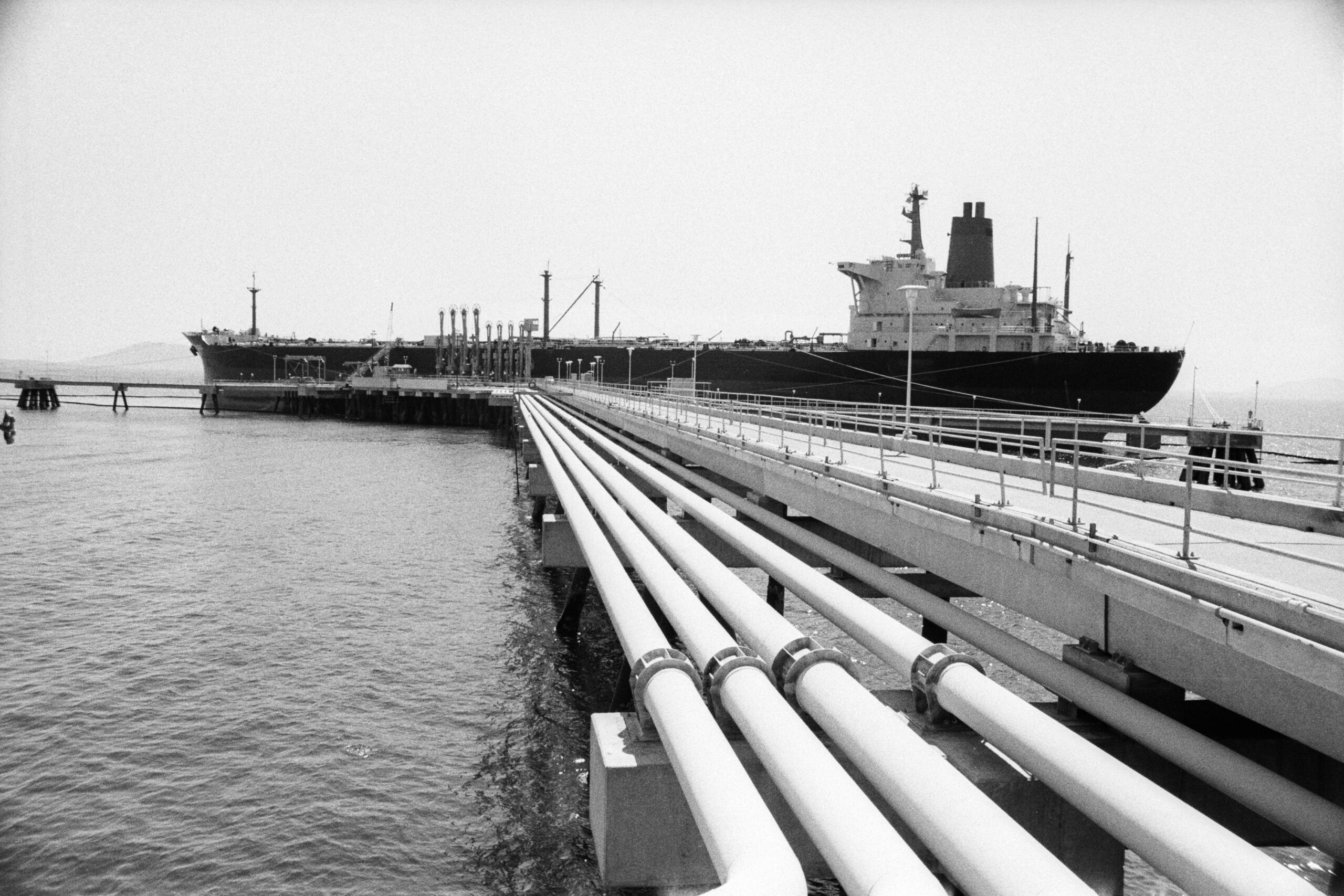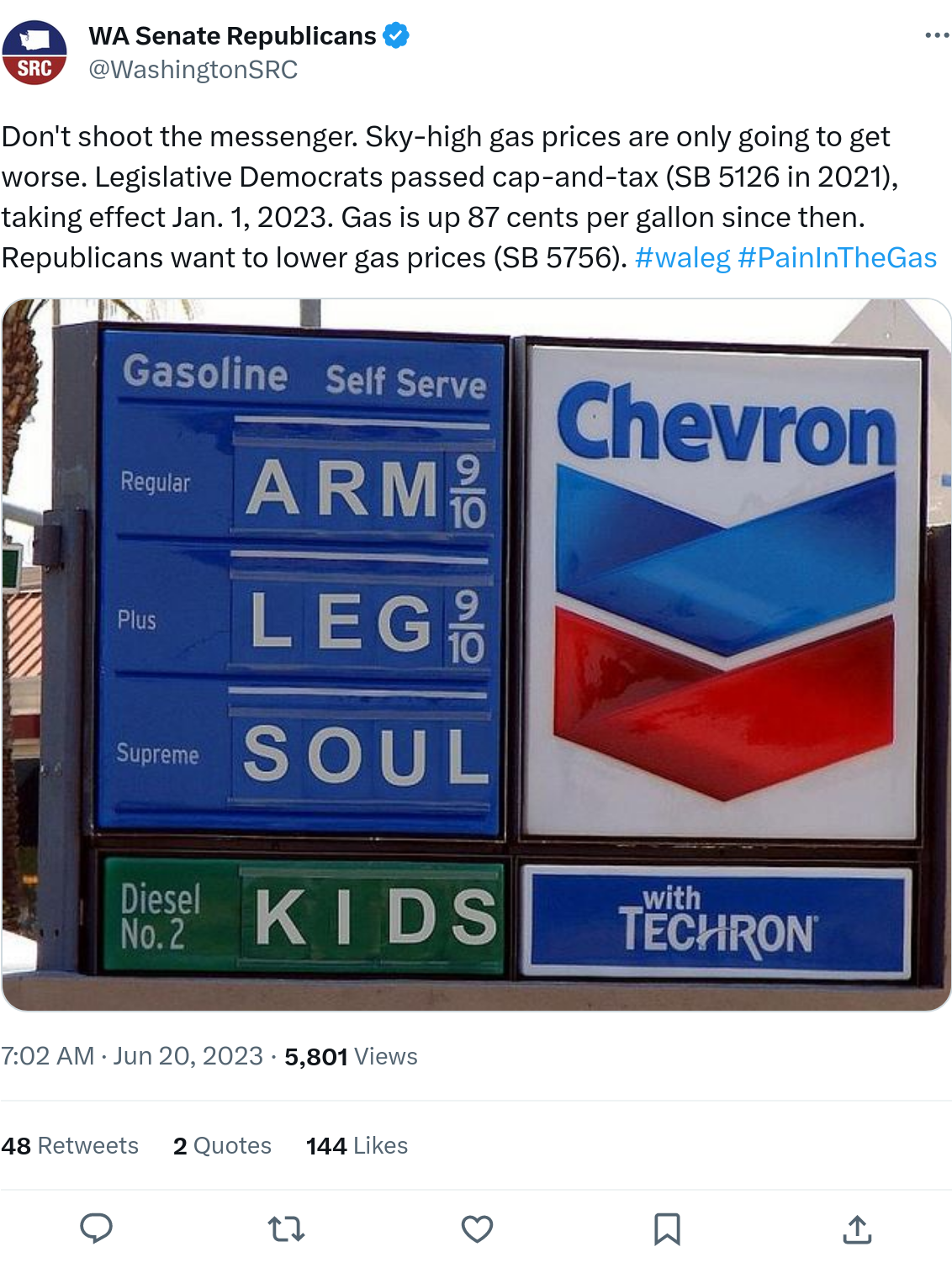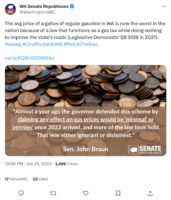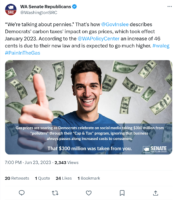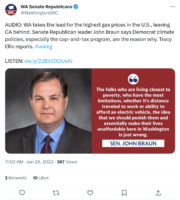Local Republicans and their allies working at right wing think tanks have been on a tear these past few weeks about high gas prices, complaining about how Washington now has the highest prices in the country and trying to hang the blame for those increases on the Climate Commitment Act and Democratic elected officials, particularly outgoing Governor Jay Inslee, who isn’t seeking another term.
For example, the Washington State Senate Republican caucus’ Twitter account — which is operated as if it were the online bullhorn of a hyperactive political action committee rather than the online presence of a legislative caucus — keeps programmatically posting tweets like this, often laden with stock photos:
Right wing operatives and intellectuals have pitched or gladly participated in stories that seek to ascertain what’s causing gas prices to go up, which have in turn inspired opinion pieces, like this Danny Westneat column from yesterday.
Buried or even left unsaid in much of the coverage is the truth of the matter: Gas prices in Washington State have increased because obscenely profitable oil companies have decided to charge us more. Which is something they were already doing even before the Climate Commitment Act was implemented.
“What you pay at the gas pump is a product of many factors: the global trading price of crude oil, market conditions, production capacity, transport costs, subsidies, taxes, other policies, and of course the oil industry’s own price manipulations to maximize profits,” Climate Solutions explained last week.
“In a nutshell, the more you pay at the pump, the more profit the oil industry makes. But there’s a lot more than that at stake for oil companies.”
“When it comes to selling gas, the Pacific Northwest is the United States oil industry’s cash cow. In December 2022, oil retailers made 85.6 cents in profits for every gallon of gas sold in Washington. That made Washington the third-most profitable state in the country for gas sales. In Oregon during the same period, 95.3 cents per gallon was pure profit for the oil industry. That put the Beaver State in 2nd place for the industry’s most profitable state for gas sales.”

“With so much profit on the line, it’s no wonder the oil industry has come out swinging against climate protection in Oregon and Washington. The fossil fuel industry doesn’t care whether your air is breathable in fifty years, they just want your money now. It’s true that efforts to reduce pollution have compliance costs. However, even if we assume that the oil industry passes 100% of those costs on to consumers, that’s still far less than the profits they’re raking in.”
“What effective climate policies do is expand access to cleaner, more affordable ways to get around — things that threaten the oil industry’s near-monopoly, which makes it harder for them to continue bringing in extreme profits.”
“Jack up gas prices, rake in huge profits, then blame environmental policies and ignore the monopolistic forces at play. That’s the oil industry playbook.”
It’s also a playbook that local Republicans feel offers them political opportunities. They’re out of power in Washington State, and while they’ve continued to lose big for several consecutive cycles, there’s always another election over the horizon.
And so they play the blame game.
Not only is it fun for Republicans to attack Democrats over high gas prices, it gives them a chance to suck up to some of their key funders. Their friends in the oil industry just love the tweets you see above, because communications campaigns like this help obscure who’s really responsible for the price increases.
You won’t find any tweets from local Republicans or right wing think tanks like the Washington Policy Center criticizing big oil companies over high gas prices. Not a one. You will see plenty of calls to repeal the Climate Commitment Act, though.
Republicans seem to be calculating that once Washingtonians are frustrated enough with high gas prices, public support for policies like the Climate Commitment Act will evaporate. They seem convinced in the potential for high gas prices to be an amazing winning wedge issue that will help them politically.
However, our research suggests they are wrong.
About a year ago, when Republicans were trying to exploit higher gas prices as an issue to drive their desired “red wave” in the midterms, we decided to ask a sample of likely 2022 Washington State voters whether they supported climate policies — even if it meant having to pay more for gasoline and home heating fuel (which we tacked on for good measure). We found that a firm majority said yes.
Take a look:
QUESTION: Do you strongly support, somewhat support, somewhat oppose, or strongly oppose the adoption of laws in Washington State that aggressively respond to the threat of climate damage, such as restrictions on air and water pollution, even if that means paying more for gasoline and home heating fuel?
ANSWERS:
- Support: 55%
- Strongly support: 42%
- Somewhat support: 13%
- Oppose: 39%
- Somewhat oppose: 12%
- Strongly oppose: 27%
- Not sure: 6%
This data is from a survey of 1,039 likely 2022 Washington State voters that fielded Wednesday, June 1st through Thursday, June 2nd, 2022.
Again, that’s June of 2022 — not this month.
It utilizes a blended methodology, with automated phone calls to landlines (50%) and text message answers from cell phone only respondents (50%).
The poll was conducted by Public Policy Polling for the Northwest Progressive Institute and has a margin of error of +/- 3.0% at the 95% confidence interval.
More information about the survey’s methodology is available here.
As explained above, climate policies are not what’s causing higher gas prices.
But even if many Washingtonians buy into the right wing misinformation that is circulating, that’s not going to cause public opinion to turn against climate action policies. In particular, suburban voters aren’t going to start voting for Republicans in 2024 because they have buyer’s remorse about Democrats passing climate action laws. Sorry, Republicans — this campaign won’t yield political gold for you.
We’ve been asking voters whether they support investing in combating climate damage for almost ten years, and we have consistently found supportive majorities — typically between 55% and 58% — in survey after survey, year after year. The results above are consistent with what we’d expect to see in response to a question asking whether people support cap and invest, or a pollution tax.
It says a lot about Washingtonians that they remain supportive of taking climate action even if a consequence is higher gas prices and home heating costs.
We are a state that is a national leader in environmental protection, in all areas — from reducing waste to valuing trees to fighting pollution to conserving our remaining wild and majestic places. We are not a pushover for the oil industry, which happens to operate a bunch of refineries on the shores of our Salish Sea.
We should respond to price gouging in a way the oil companies will understand: by proposing and exploring more ideas to secure a just and accelerated transition away from fossil fuels to a new energy economy, like a windfall profits tax.

